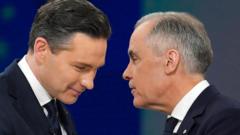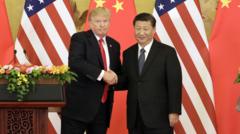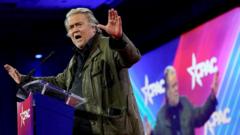In a dramatic turn of events, the Canadian election landscape has shifted in ways few could have predicted. Once deemed nearly certain, Conservative leader Pierre Poilievre’s dominance faced a staunch challenge from the revived Liberal party led by former central banker Mark Carney. With polls showing a remarkably tight race, both parties have intensified their campaigns in a bid for voter support amid lingering fears of American influence.
A Historic Political Showdown: Liberals vs. Conservatives in Canada

A Historic Political Showdown: Liberals vs. Conservatives in Canada
As election day nears, Canada is witnessing an intense political battle echoing U.S. tensions.
At a rally in London, Ontario, the atmosphere was electric as Liberal leader Carney articulated his campaign’s core message, blaming former U.S. President Trump for perceived threats to Canada’s sovereignty. Crowds erupted with passionate denunciations of these threats, brandishing Canadian flags. In contrast, during Poilievre’s gatherings, his supporters rallied behind a banner of nationalism, eagerly promoting his vision of political change after years of Liberal governance.
The pressing concern for many voters revolves around economic stability, housing opportunities, and social issues. A shift saw the Liberals, once trailing by a significant margin, increasingly appealing to disillusioned Progressive voters and younger generations who feel cut off from the possibility of home ownership. Emotional anecdotes from first-time rally attendees illustrated the underlying anxiety shaping electoral preferences.
Initially tipped to win due to months of commanding leads in polling, the Conservative party finds itself grappling with a rejuvenated Liberal party that is initiating a new narrative. Carney, with his extensive experience in financial leadership, seeks to assure voters that he is equipped to handle the encroachment of U.S. policies. Conversely, Conservatives are attempting to redefine their message amidst historical partisan divides and rising voter discontent toward established authorities.
The election has re-energized conversations around nationalism as voters navigate their preferences in relation to their national identity and economic futures. As political power wavers, strategical voting campaigns spearheaded by the New Democratic Party have emerged, urging voters to think critically about where their support could create meaningful impact.
The mounting excitement surrounding the upcoming election is compounded by concerns regarding a broader range of issues typically overshadowed by economic debates, such as immigration, climate change, and indigenous rights. Therefore, the stakes are monumental not just for party fortunes, but for the very identity of Canada moving forward.
Ultimately, as the countdown to election day ensues, the challenge remains for both parties to align their platforms not only with voter sentiments but also with the pressing needs of a nation grappling with external pressures. The outcome remains uncertain, but the fervor around this historic election indicates a crucial moment for Canada on the global political stage.
The pressing concern for many voters revolves around economic stability, housing opportunities, and social issues. A shift saw the Liberals, once trailing by a significant margin, increasingly appealing to disillusioned Progressive voters and younger generations who feel cut off from the possibility of home ownership. Emotional anecdotes from first-time rally attendees illustrated the underlying anxiety shaping electoral preferences.
Initially tipped to win due to months of commanding leads in polling, the Conservative party finds itself grappling with a rejuvenated Liberal party that is initiating a new narrative. Carney, with his extensive experience in financial leadership, seeks to assure voters that he is equipped to handle the encroachment of U.S. policies. Conversely, Conservatives are attempting to redefine their message amidst historical partisan divides and rising voter discontent toward established authorities.
The election has re-energized conversations around nationalism as voters navigate their preferences in relation to their national identity and economic futures. As political power wavers, strategical voting campaigns spearheaded by the New Democratic Party have emerged, urging voters to think critically about where their support could create meaningful impact.
The mounting excitement surrounding the upcoming election is compounded by concerns regarding a broader range of issues typically overshadowed by economic debates, such as immigration, climate change, and indigenous rights. Therefore, the stakes are monumental not just for party fortunes, but for the very identity of Canada moving forward.
Ultimately, as the countdown to election day ensues, the challenge remains for both parties to align their platforms not only with voter sentiments but also with the pressing needs of a nation grappling with external pressures. The outcome remains uncertain, but the fervor around this historic election indicates a crucial moment for Canada on the global political stage.






















